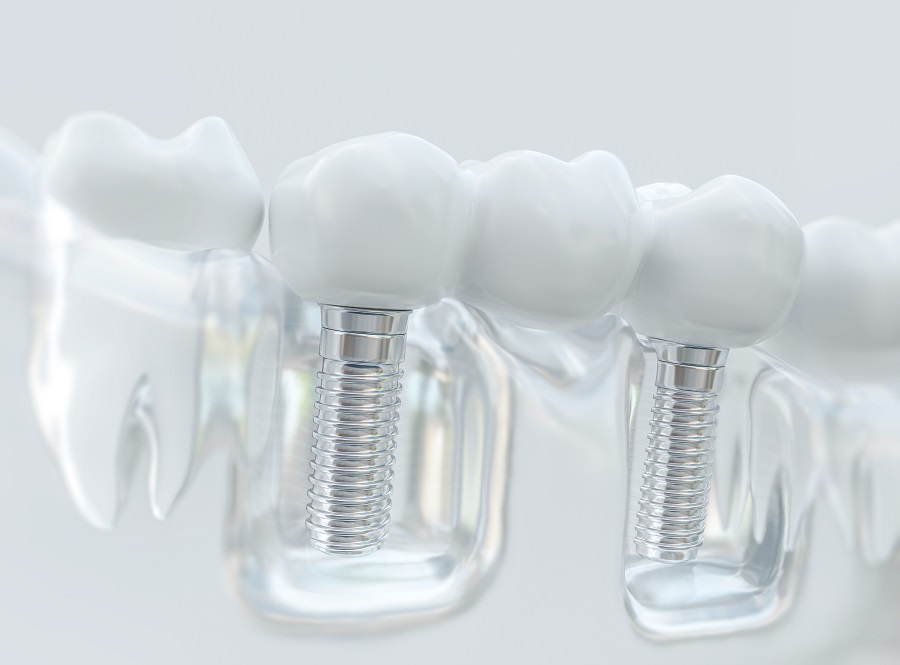
There is no doubt that getting dental implants can change your smile and your life for the better. Dental implants are one of the most popular tooth replacement solutions currently available, largely thanks to the superior technique that is used to replace them. While this technique helps to make them more secure, stable, discreet, and durable amongst other benefits, it does require a somewhat invasive surgery. This means that patients who choose dental implants will have to prepare for and allow themselves the necessary recovery time for their mouth to heal.
Here’s what you need to know about what to expect from a dental implant surgery recovery period.
The placement of dental implants
In order to understand why the recovery process of dental implants is necessary and to give you better insight about what to expect, you need to be fully aware of what the surgery to place them involves in the first place. Dental implants are titanium posts or screws that are designed to replicate natural tooth roots and anchor your replacement teeth. In order to do this, they need to be surgically placed into the jawbone at pre-determined locations that will offer the best support depending on the type of restoration you are having. Single missing teeth require just a single implant post, whereas bridges must be supported on two. Dental implants can also be used to support partial and full dentures and for this, you may need anywhere from three to eight implant posts. Your provider will be able to advise you exactly how many are required, and x-rays will be taken to plan their placement.
During the procedure, which is carried out using local anesthetic and potentially sedation, a hole is drilled through the gum and into the bone where the implant post will be placed. Once inserted, the bone is left to heal around the post which is what secures it permanently in place. This process, called osseointegration, can take several months. In the meantime, you’ll be fitted with a temporary restoration so that you can still use your teeth during which you will have to take special care not to pull the post out. When the bone has regenerated around it, you will be able to return to have your final restoration fitted.
What to expect after your dental implant procedure?
It is important to remember that every patient is unique and therefore, the recovery timeline for each individual can vary on a case by case basis. However, there are certain things that nearly all patients can expect and should be aware of.
Discomfort is normal. Unfortunately, there is no getting away from the fact that this is an invasive procedure and as such, you will be in some discomfort following your surgery. You will be advised to take over the counter pain medications as necessary, but some patients do end up being prescribed something a little stronger for the first few days. You should make sure that you only take medications approved by your dental implant provider and take anything prescribed to you exactly as directed.
Swelling is normal. Again, inflammation and swelling are a natural reaction to any surgery and most often occurs around the sites where incisions have been made. Holding a cold compress against your face near the incision sites can be helpful to counteract swelling and help to reduce any discomfort. This should resolve itself within a week or so of your surgery.
Your diet will need to be temporarily adjusted. Unsurprisingly, you will need to stick to a soft food diet for at least several days after surgery, and possibly a little longer. Your dental implant provider will give you a comprehensive list of the foods that you may consume and those which you should avoid.
You will need to follow all post-operative instructions. Your dental implant provider will give you very specific instructions to follow regarding how to care for your dental implants. This will include keeping the incision sites clean as well as what to do if you have any concerns. You will also be advised to avoid taking any medications that contain aspirin, blowing your nose, and smoking. Smoking is especially frowned upon when it comes to dental implants since, in addition to the normal adverse health effects of these products, they can slow your recovery and increase your risk of complications. You may even be refused a dental implant procedure if you are a smoker.
For any further advice on what to expect from your recovery from dental implant surgery, please contact our experienced dental team.










